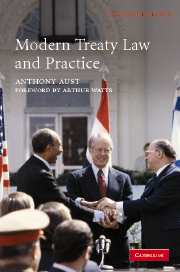Book contents
- Frontmatter
- Contents
- Foreword to the first edition by Sir Arthur Watts
- Preface to the second edition
- Articles of the Convention cited in the text
- Table of treaties
- Table of MOUs
- Table of cases
- Glossary of legal terms
- List of abbreviations
- Introduction
- 1 Vienna Convention on the Law of Treaties 1969
- 2 What is a treaty?
- 3 MOUs
- 4 Capacity to conclude treaties
- 5 Full powers
- 6 Adoption and authentication
- 7 Consent to be bound
- 8 Reservations
- 9 Entry into force
- 10 Treaties and domestic law
- 11 Territorial application
- 12 Successive treaties
- 13 Interpretation
- 14 Third states
- 15 Amendment
- 16 Duration and termination
- 17 Invalidity
- 18 The depositary
- 19 Registration and publication
- 20 Dispute settlement and remedies
- 21 Succession to treaties
- 22 International Organisations
- 23 Drafting and final clauses
- Appendices
- Index
19 - Registration and publication
- Frontmatter
- Contents
- Foreword to the first edition by Sir Arthur Watts
- Preface to the second edition
- Articles of the Convention cited in the text
- Table of treaties
- Table of MOUs
- Table of cases
- Glossary of legal terms
- List of abbreviations
- Introduction
- 1 Vienna Convention on the Law of Treaties 1969
- 2 What is a treaty?
- 3 MOUs
- 4 Capacity to conclude treaties
- 5 Full powers
- 6 Adoption and authentication
- 7 Consent to be bound
- 8 Reservations
- 9 Entry into force
- 10 Treaties and domestic law
- 11 Territorial application
- 12 Successive treaties
- 13 Interpretation
- 14 Third states
- 15 Amendment
- 16 Duration and termination
- 17 Invalidity
- 18 The depositary
- 19 Registration and publication
- 20 Dispute settlement and remedies
- 21 Succession to treaties
- 22 International Organisations
- 23 Drafting and final clauses
- Appendices
- Index
Summary
Order is heaven's first law.
In addition to this papal pronouncement, McNair had emphasised the importance of registering and publishing treaties, and rightly saw the United Nations Treaty Series (UNTS) as ‘an indispensable piece of international apparatus’. Yet, sometimes it can still be difficult to find the text of treaties, particularly recent ones. Although there are other ways of finding them using the Internet (even Google), the main place is still the UNTS. But, as we shall see, many treaties are never registered with the United Nations. A treaty cannot be registered until it is in force, and even when it has been registered, its publication in the UNTS may be delayed. And, even once it is in the UNTS, there may be difficulty in searching for it, especially online, unless one knows the registration number. This book gives that number.
This chapter will explain the procedure for registering a treaty; note the important improvements that have been made, and which are to be made, to the UNTS; discuss the legal effect of registration or non-registration; and offer suggestions on other ways of finding the texts of treaties, as well as information about treaty status.
Registration
Although the successful negotiation of a treaty may require secrecy, its existence requires openness. Abhorrence at the discovery, during and in the aftermath of the First World War, of secret treaties, and President Woodrow Wilson's call for ‘open covenants’, resulted in Article 18 of the Covenant of the League of Nations.
- Type
- Chapter
- Information
- Modern Treaty Law and Practice , pp. 339 - 351Publisher: Cambridge University PressPrint publication year: 2007



